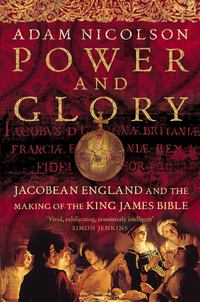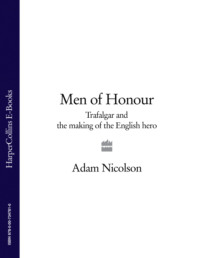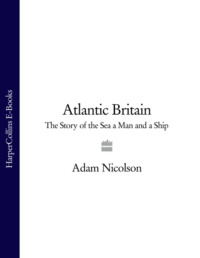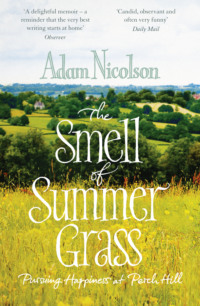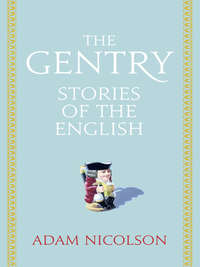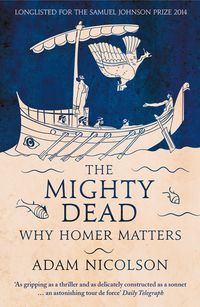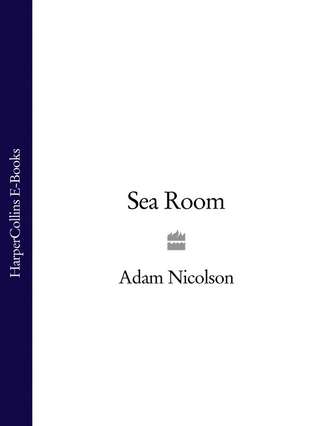
Полная версия
Sea Room

Sea Room
AN ISLAND LIFE
Adam Nicolson
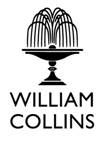
Copyright
Published by William Collins
an imprint of HarperCollinsPublishers 77–85 Fulham Palace Road, Hammersmith, London W6 8JB
www.harpercollins.co.uk
Copyright © Adam Nicolson 2001
Adam Nicolson asserts the moral right to be identified as the author of this work
A catalogue record for this book is available from the British Library
All rights reserved under International and Pan-American Copyright Conventions. By payment of the required fees, you have been granted the nonexclusive, nontransferable right to access and read the text of this e-book on-screen. No part of this text may be reproduced, transmitted, downloaded, decompiled, reverse engineered, or stored in or introduced into any information storage and retrieval system, in any form or by any means, whether electronic or mechanical, now known or hereinafter invented, without the express written permission of HarperCollins e-books.
HarperCollinsPublishers has made every reasonable effort to ensure that any picture content and written content in this ebook has been included or removed in accordance with the contractual and technological constraints in operation at the time of publication.
Source ISBN: 9780006532019
Ebook Edition © NOVEMBER 2014 ISBN: 9780007380718
Version: 2014-10-24
Dedication
For my father
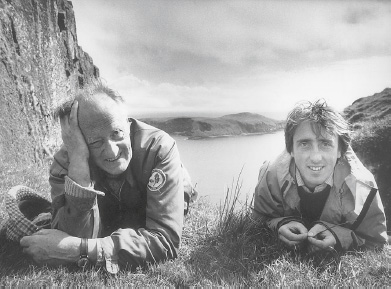
Maps
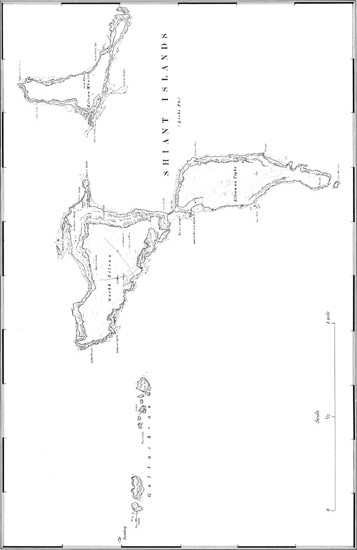
Contents
Cover
Title Page
Copyright
Dedication
Maps
1
2
3
4
5
6
7
8
9
10
11
12
13
14
15
16
Keep Reading
Bibliography
Index
Acknowledgements
Note
Praise
About the Publisher
1
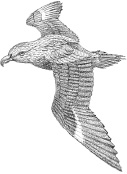
FOR THE LAST TWENTY YEARS I have owned some islands. They are called the Shiants: one definite, softened syllable, ‘the Shant Isles’, like a sea shanty but with the ‘y’ trimmed away. The rest of the world thinks there is nothing much to them. Even on a map of the Hebrides the tip of your little finger would blot them out, and if their five hundred and fifty acres of grass and rock were buried deep in the mainland of Scotland as some unconsidered slice of moor on which a few sheep grazed, no one would ever have noticed them. But the Shiants are not like that. They are not modest. They stand out high and undoubtable, four miles or so off the coast of Lewis, surrounded by tide-rips in the Minch, with black cliffs five hundred feet tall dropping into a cold, dark, peppermint sea, with seals lounging at their feet, the lobsters picking their way between the boulders and the kelp and thousands upon thousands of sea birds wheeling above the rocks.
In summer, the grass on the cliff-tops is thick with flowers: bog asphodel and bog pimpernel; branched orchids, the stars of tormentil and milkwort. ‘Under such skies can be expected no great exuberance of vegetation,’ Dr Johnson wrote, but this miniature spangle of Hebridean flora, never protruding its yellows and deep purples more than an inch or two above the turf, is a great and scarcely regarded treasure. I think of it when in England I walk on expensive Persian rugs; the same points of dense, discreet colour, the same proportion of ground to decoration; a sudden flash of the Hebrides in a rich man’s rooms. It is a private signal to me, a bleeping underfoot, winking through the burr of conversation and offered drinks: Remember me.
At times in the last two decades, these islands have been the most important thing in my life. They are a kind of heartland for me, a core place. My father bought them over sixty years ago for £1,400, he gave them to me when I was twenty-one, and I shall give them to my son Tom when he is twenty-one in four years’ time. This is not, as cynics have sometimes said, for tax reasons. The Shiants seem scarcely to do with money and, anyway, they have been a catastrophic investment. For the same amount, at the same time, my father could have bought a Jacobean manor house in Sussex or a two hundred-acre farm of prime arable in Cambridgeshire. Each would be worth a million or more by now. As it is, if I sold the Shiants, I could perhaps buy a two-bedroom flat in Fulham.
This was never a question of financial riches. My father bought the islands and gave them to me because as a very young man he had felt enlarged and excited by the ownership of a place like this, by the experience of being there alone or with friends, by an engagement with a nature so unadorned and with a sea- and landscape so huge that it allowed an escape into what felt like another dimension. It was a way of leaving home, a step into a different world. He described this, fitfully, in a letter to his brother Ben on first going there in 1937: ‘I would wake up the next morning to find the sun in a sky as pure as a Bavarian virgin,’ the twenty-year-old Balliol undergraduate half-joked.
I would lie all morning with no clothes on, on a rock overlooking the sea, reading and annotating Hegel. In the afternoons I used to run bare-footed across the mile of heather to the edge of the northern cliff, there flinging myself down, to read, or write, or gaze out to sea thinking about life, and what Heaven this was. The view from the top is such that only Greece could parallel.
And then he torpedoed it, embarrassed: ‘One becomes very Golden Bough in these conditions, I’m afraid.’
For all the camouflage, the experience was real, and forty years later he wanted, I think, to give that same enlargement to me: that wonderful sea room, the surge of freedom which a moated island provides. The gift was this: the sensation I can now summon, anywhere and at any time, of standing in the pure air streaming in off the Atlantic, alone on these islands which the last inhabitants left a hundred years ago. I have peered at them in every cranny: I have hauled lobsters and velvet crabs from the sea; picked the edible dulse from the walls of the sea caves and of the great Gothic natural arch which perforates a narrow horn of one of the islands; scrambled among the hissing shags and looked down the dark slum tunnels where the puffins live and croak their curious, endearing note, like a heavy door opening on a rusted hinge; and I have lain down in the long grass while the ravens honked and flicked above me and the skuas cruised in a milk-blue sky. I have felt at times, and perhaps this is a kind of delirium, no gap between me and the place. I have absorbed it and been absorbed by it, as if I have had no existence apart from it. I have been shaped by those island times, and find it difficult now to achieve any kind of distance from them. The place has entered me. It has coloured my life like a stain. Almost everything else feels less dense and less intense than those moments of exposure. The social world, the political world, the world of getting on with work and a career – all those have been cast in shadow by the scale and seriousness of my brief moments of island life.
There was a time when I thought that to give the islands away, even to Tom, would be an unbearably difficult thing. Sometimes, away from them, late at night in strange hotels, I would listen to the shipping forecast – ‘Hebrides, Minches, Storm Force Ten, backing southwesterly, sleet, visibility two hundred yards’. I would think of them then, wet, battered and impossible, the rain slinging itself in handfuls of rice against the windows of the bothy, the churning of the sea, when, as it says in a famous Gaelic poem, ‘The whorled dun whelk that was down on the floor of the ocean,/Will snag on the boat’s gunwales and give a crack on her floor,’ when the cowering birds would be tucked in behind the boulders, and the sheep would be enduring the storm with the patience of saints and the dignity of martyrs. Those were the moments, not in their presence, when I felt most deeply attached to them. The Shiants are the most powerful absence I know. On every flight across the Atlantic, I would peer out for them, looking for an opening in the clouds to see them there, still and map-like below me, with the sea sheened and glittery around them, while the stewardess handed out headsets and warm towels. That too would be a moment of dreaded loss.
That has changed now. I have changed and I do not, I think, need them as much as I once did. The gift I received is the gift I want to make. They are a young man’s place and always have been. Tom will have his time there too, with his own friends and his own discoveries. He will know the Shiants in ways different from his father’s and grandfather’s. A place evolves in the minds of the people who possess it and it is Tom’s turn now.
This book is my final immersion in them. I have tried to get to know them as I have scarcely done before. No one previously has written at any length about the Shiants and this is both an opening and, for me anyway, a closing of their account. It is an attempt to tell the whole story, as I now understand it, of a tiny place in as many dimensions as possible: geologically, spiritually, botanically, historically, culturally, aesthetically, ornithologically, etymologically, emotionally, politically, socially, archaeologically and personally. It is a description of what my father gave to me and of what, in the spring of 2005, I shall give to my son.
A year or so ago, the West Highland Free Press, the radical(ish) anti-lairdist paper produced in Broadford in Skye, heard that I was planning to write a book about the islands and produced this cartoon:
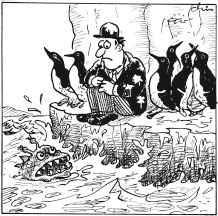
I am the English toff. I am drowning in everything the guillemots can throw at me and I am burped at by sea monsters. I might crouch on the slippery rock ledges but I don’t belong there. I might dream of the Shiants, but I should by rights be back in my natural environment, the club in St James’s, brushing up my bowler, sprucing up my moustache, talking to other members about the state of the market or the loss of empire. My presence on the Shiants is about as easy or convincing as a basking shark ordering Sole Véronique in the dining room at the Ritz.
In the Hebrides, that is a widely shared, if rarely stated, attitude. The English landowner is an alien, part joke, part irritant, a tourist who thinks he has some claim on the place. Once in the midday dark of Macleod’s Bar next to the quayside in Tarbert, I was having a drink with Uisdean MacSween. Hughie MacSween, as I know him, the shepherd from Scaladale on Loch Seaforth, is one of the great sheep men on Harris. For many years of my boyhood and young adulthood he had the flock on the Shiants. He became, technically, my tenant. He paid me fifty pounds a year for the grass. But the reality was different: he was the master and I the pupil. I always felt embraced by his presence. He whispered his stories through lips that clung doggedly to the crushed stub-end of a roll-up, his eyebrows, like sprigs of long-grown lichen, leaping at the punch lines. The movement of his mouth was so quiet, like the fluttering of a flame, that you would always be creeping closer to hear him, to put your ear to his lips. And while he spoke, his eyes would move from you to the horizon and back: you, the listener, the target of the words, the horizon somehow their source. As he plied me with another pint and another chaser, long, growling laughs would come sloping out of his chest, breaking off into bronchial chaos, and then he would suddenly grasp my arm at some urgent point, some critical fact, some hilarious aspect – a long, deep drag on the last of the cigarette – of human folly.
For years, Hughie MacSween was the Shiants for me. He told me once, long after ill health had forced him to give up the islands, that he never went to sleep at night without his mind roving across them from one end to the other: up the steep climb from the landing beach, along the sheep paths there, over the shoulder and on to the broad back of Garbh Eilean, skirting the edge of the big peat-filled hollow, down to the valley at Glaic na Crotha, on towards the far end of Stocanish, where the lambs used to jump one by one down the steps of the north cliffs to the grass growing ever greener nearer the sea, until they found themselves stranded, and he would have to rescue them, bringing them back tucked under his arm one at a time like a job lot of bagpipes. ‘I know those islands inch by inch,’ he said, and then added the words I have treasured ever since: ‘And I know it is the same with you.’
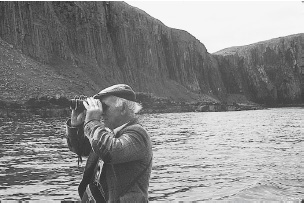
A man came up to us, a little drunk, his cap on his head, his skin white. He ignored Hughie. ‘Are you the man who says he owns the Shiants?’ he said to me, standing over me.
‘Yes,’ I said, smiling charm, the English defence, ‘I am actually.’
‘Well you’re a sackful a shite.’
I laughed.
‘You can no more say that those islands belong to you than I can say that I’m the landlord of the moon.’
Hughie rolled his head and smiled at the man, there-thereing, calming the situation, murmuring to both of us that quietening growl he uses to his dogs. ‘Sit down, sit down,’ he said, patting the bench beside him.
The man sat down and went on. He took Hughie by the arm. ‘This is the man who owns the Shiants. They’re yours, aren’t they, Uisdean?’
Hughie looked down, his turn for bashfulness. ‘Oh, I wouldn’t quite say that, Murdo.’
‘Well, this is the man who should say he owns the Shiants anyway. He’s got the sheep on the place. He does the work there. And he looks after it. And what have you got to say about it? What do you do to say that the Shiants are yours?’
The answer, if I had given it, would have ended in a fight. The Shiant Isles are mine; I can say that they are my five hundred acres of rock, grass, cliff and wildness, stuck out in the middle of the Minch between Skye and Lewis, besieged by the seas around them, because my father gave them to me. He had bought them after his grandmother had died and left him some money. The advertisement had been seen by his mother in the Daily Telegraph. Colonel Macdonald from Tote in Skye, who had bought the islands the year before, had imagined they might be ideal as a stud where he could breed racehorses. He had been sweet-talked into the ridiculous purchase by Compton Mackenzie, the novelist, who owned the islands at the time and was, as ever, strapped for cash. Mackenzie had acquired them in 1925 from the executors of Lord Leverhulme, and Leverhulme had bought them in 1917, along with the whole of Lewis and Harris, from the Mathesons. The Mathesons, in their turn, afloat on opium millions from trade between Hong Kong and mainland China, had in 1844 bought Lewis from the Mackenzies, the ancient family of the Earls of Seaforth, who withdrew to their territories on the mainland. The Mackenzies, in a chaotic period of unparalleled violence and treachery at the beginning of the seventeenth century known, in one document, as ‘The Ewill Trowbles of the Lewes,’ in which ‘the Macleoid of the Lewes was with his whol Trybe destroyed and put from the possession of the Lewes’, had bought the property from some gentlemen of Fife, who had been granted it by the Crown to set up a colony, even though the hereditary owners, the Macleods of Lewis, were still, at least partly, in possession. Only ‘after great trouble and much blood’ did the Mackenzies get hold of the islands. For their part, the Macleods – ‘the stoutest and prettiest men, but a wicked bloody crew whom neither law nor reason could guid or moddell, perpetuallie destroying one another’ – had stolen it in the twelfth century from the Nicolsons, who had arrived as Vikings perhaps three hundred years earlier. Presumably they – we – had done dreadful things to the previous inhabitants.
Nicolson, Macleod, Mackenzie, Matheson, Leverhulme, Mackenzie, Macdonald, Nicolson: twelve hundred years, eight sets of landlords claiming the Shiants as theirs. I was their heir and that’s why I could claim to be their owner and Hughie MacSween couldn’t. But I didn’t say any of that. Hughie bought the man a drink and – the blood of the Vikings running a little thin – I hid behind him.
In 1894, the Reverend Donald MacCallum, the highly emotional Minister of the Parish of Lochs in Lewis, of which the Shiants have been a part since the 1720s, made a long and passionate statement to a Royal Commission that was hearing evidence on the state of crofters in the island. Rolling in its Biblical allusions, wildly overstated, dependent more on a rhetoric that goes back to the subversive roots of Christianity itself than to any modern understanding of rights and responsibilities, it is one of the grandest attacks ever made on the idea of the landlord. ‘Great evils,’ MacCallum began largely,
have necessarily resulted from the fact that land, lake, river, and estuary are appropriated to the sole use, and regulated by the will of a few irresponsible individuals styled by themselves and others as lords. Every man has a right, natural, and God-given, to the earth and its fullness – its fullness of light, air and water, of vegetation and fruit, of beast, bird and fishes, of metals and minerals. The lords who first sold the land had no right to do so, and therefore the lords who bought the land are not the owners thereof. That which a man has no right to sell cannot become the property of the man who buys it.
My apostolic succession from the Nicolson Vikings a millennium ago means nothing. The idea of ownership is itself illegitimate. MacCallum went on:
Lordism impoverishes the land. The wealth that is on sea and land, instead of being used in rearing the families of those who earn it, is spent in providing luxuries for idle lords. The destitution and the plague which follow in the wake of this usurper lift up their voices against it and condemn it. Lordism devastates the land. On the face of the deserted villages, once the happy homes of the free and the brave, now lying in silent desolation, we read: ‘The scourge of lordism has passed over us.’ I never heard of any creature having a swallowing capacity equal to that of lordism. The cattle and the ears of corn which Pharaoh saw in his dream come nearest to it.
There are many ruins and signs of abandonment on the Shiants and in Pairc, the big block of Lewis nearest to the islands, and that emptiness now is a symptom of the very landlordism of which I am the current beneficiary.
Under cross-examination from the Commission, MacCallum was taken apart. He clearly knew very little indeed about the issue over which his pulpit language had taken such magnificent flight. He had no idea of the acreage of his parish, the number of its inhabitants, the amount of fertile arable ground available to them or the productivity of the lands which he claimed they were denied. He was humiliated by the lawyers. But his words, which I first read twenty years ago in the enormous volume the Commission produced, continue to resonate with me. Perhaps what MacCallum has to say is true of all property, but the outlines are especially clear in this stark and naked landscape. My claim on the Shiants, not to put it too finely, is dependent on a succession of acts of violence, quite literally of murder, rape and expulsion. Money may have passed hands recently – my father paid £1400, Macdonald £1500, Compton Mackenzie £500 – but what the Rev. MacCallum said is true: ‘The lords who first sold the land had no right to do so, and therefore the lords who bought the land are not the owners thereof.’
My islands are not a place from which to exclude others. I have derived more richness from the Shiants than from anywhere else on earth. I have felt utterly sustained for years at a time by this wild and magnificent place. Is it for me, given this, to shut anyone else out? There are several good landlords on Lewis and Harris, who allow free, universal and weekly access on a Saturday to their salmon rivers; who encourage those who might want to poach the deer to come and shoot the hinds, again for free, in the season. These are recent developments and not all Lewis landlords have subscribed to them. There are one or two who still operate estate policies of rigid and at times harsh exclusivity, who do their best to prevent people walking on their hill, at least during the stalking season, who send out their gamekeepers and water bailiffs to search through the fishing boats in the coastal townships, looking for the nets used by salmon poachers, who have even sent helicopters out to look for nets in the sea, who in the last few years have attempted to have a stretch of public road privatised. There are some estate owners, in other words, who continue to behave as if their ownership of these pleasure zones bears few or even no responsibilities to neighbouring communities.
That, I think, is wrong and this book is in part a response to it. I may be in possession of the deeds of the Shiants, I may love them more than anywhere else on earth, but I do not feel that I have anything resembling an exclusive right to them, or that any landlord could. For all MacCallum’s afflatus – you can see his face reddening as he makes his statement, his rhetoric inflating and wobbling like the proboscis of an elephant seal in front of the Commissioners, and then its collapse as their scepticism exacts its price, his deflation afterwards, his running over it in his mind back at the manse: the passages where it had sounded good; those where, as even he suspected, it hadn’t – despite all of that, he was right about this. Land – particularly land that is out on the edge of things, and particularly land that is a rich concentration of the marvels of the natural world – is to be shared. This book is an attempt to share the Shiants.
They are not really a lonely place. That is a modern illusion. For the Shiants, the question of solitude figures only twice: once in the flowering of Columban monasticism between the seventh and tenth centuries, and once in the twentieth century. For most of their history, the Shiants were not, like some piece of Wagnerian stage scenery, lumps of rock in a hostile sea, beside which the solitary hero could exquisitely expire. They were profoundly related to the world in which they were set. Until 1901 they were almost continuously inhabited, perhaps for five thousand years. Our modern view of such places as orphans or widows, drenched in a kind of Dickensian poignancy of abandonment, is, on the whole, wrong. The Shiants are rich: in the kind of island beauty to which, it is clear, men have been drawn over many thousands of years; in soils and natural fertility; in the seas around them thick with plankton, and with the layers of predatory fish and sea birds stacked four or five tiers above that. These islands in their season are the hub for millions of bird and animal lives, as dynamic as any trading floor, a theatre of competition and enrichment. They are the centre of their own universe, the organising node in a web of connections, both human and natural, which extends first to the surrounding seas, then to the shores on all sides and beyond that, along the seaways that stretch for thousands of miles along the margins of the Atlantic and on into the heartlands of Europe.


